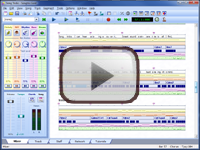(5.3) Understanding Meter
One of the most important features of music is repetition, and it occurs at many levels. If used well, repetition provides the familiarity and regularity needed for a piece of music to have cohesion and momentum. Or to put it another way, for the music to hang together and swing.
Most contemporary songs are built from repeating sections like the Verse/Chorus structure, where the same melody is reused with different - or even the same - lyrics.
Even within a verse or chorus, a musical phrase can be repeated several times. Consider how the first four notes are repeated in the traditional song When The Saints Go Marching In.

But the most fundamental level of repetition in music is the meter, or underlying rhythm. You may be familiar with the 'one - two - three - one - two - three' feel of a waltz, or the 'left - right - left - right' feel of a march. These are both examples of meter.
Meter is the driving force that repeats over and over as the music progresses, keeping time. Drums will often mark out the meter when they are played. But meter always exists in music, with or without percussion.
Meter can be counted out with a device you have probably already heard of - the metronome (notice the similarity of the words). It plays a click sound on each beat of the meter, usually with an accented click on the first beat of each repetition. Here is the sound of a metronome playing a four-beat rhythm.

You may not have noticed before, but When The Saints is based on a four-beat rhythm. Let's hear it again, this time with the metronome marking out the meter.

Meter also occurs as rhythms of other beat counts. Another common meter is based on a three-beat rhythm. Compare the feel of the meter below with the four-beat rhythm you have already heard.

A good example is the Skater's Waltz by Émile Waldteufel. Here is the main theme of that piece, with the metronome marking out the meter. In general, all waltzes are based on a three-beat meter.

|
Topic 62 of 117
| ||
Bring these music concepts to life with the free Songtrix Bronze Edition as you create songs from chords and scales.
Then publish and share your ideas with the other musicians you meet on the ChordWizard Network.
Have questions? Join the ChordWizard Network and post them in the Music Theory forum for answers and discussions on your topics of interest.








